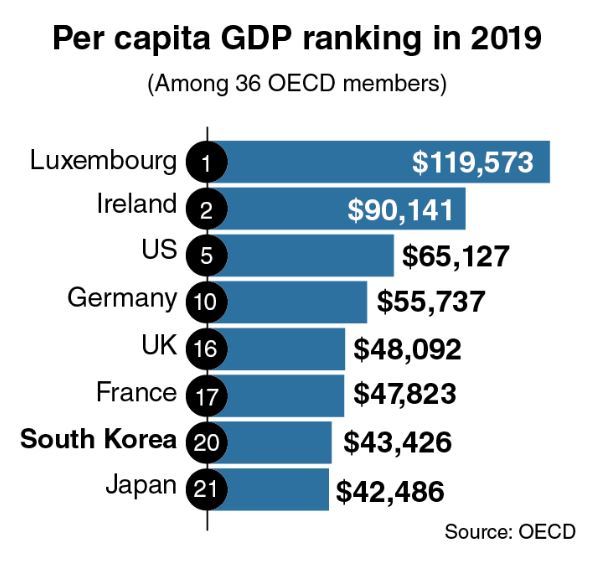 |
Headquarters of the Organization for Economic Cooperation and Development in Paris (OECD) |
SEJONG -- South Korea’s per capita gross domestic product as of 2019, assessed by the Organization for Economic Cooperation and Development, is drawing attention in terms of gauging the current level of ordinary Koreans’ purchasing power on the global stage.
The France-based organization has estimated that the nation’s per capita GDP reached $43,426 (50.59 million won, based on the 2019 average exchange rate against the US dollar) last year, which far exceeds the “nominal-based” estimate ($31,430) from the International Monetary Fund.
Though the figure for Korea still lags behind the estimate for the 36 OECD members’ average, $47,511, it outstrips the figure for Japan, which is estimated at $42,486.
In the OECD annual comparisons, Korea ranked above Japan for the third consecutive year dating to 2017 (which marked the first time in their history), taking the 20th spot in 2019 among the 36 economies. Japan was No. 21.
The figures are calculated on the basis of purchasing power parity, as an adjustment for differences in the cost of living in each country worldwide and the currency value versus the US dollar. So the PPP-based figure is different from the nominal-based per capita GDP.
The assessment standards between the OECD and IMF are estimated to be somewhat different. The IMF had also forecast that South Korea could possibly overtake Japan within several years in the PPP-based per capita GDP.
Anyway, the OECD data could indicate that ordinary people’s purchasing power in Korea is better than that of the world’s third-largest economy. Japan is suffering a prolonged economic slowdown and social problem from the world’s highest portion of senior population, which marked the world’s first superaged society and remains one of only five existing superaged countries around the globe.
But Korea is walking in Japan’s footsteps, under which the percentage of the working-age population is dwindling and the portion of seniors, aged 65 or over, is growing at a high speed.
 |
(Graphic by Kim Sun-young/The Korea Herald) |
When it comes to people aged 70 or over, 1 out of every 5 Japanese are in their 70s or over, with 1 in 10 Koreans in the corresponding age group as of 2020.
Nonetheless, the pace in Korea is noteworthy as the number of those aged 70 or above has surged more than 2 million in a decade -- from 3.41 million in March 2010 (6.8 percent of the population) to 5.55 million in March 2020 (10.7 percent).
Some local economists compare the Korea-Japan rivalry with the case between Ireland and the UK. Ireland, the world’s 31st-largest economy, overtook the UK (the world’s 5th) in per capita GDP in the early 2000s for the first time since the world started compiling the data in the 1970s.
Though Ireland later faced a phase that could have allowed the UK to regain its comparative position due to the 2009 eurozone crisis, it instead eventually widened the gap -- $90,141 vs. $48,092 in 2019 OECD data.
In the 2019 per capita GDP compared by the OECD, Luxembourg topped the list among the 36 members as it posted $119,573, followed by Ireland (2nd) and Switzerland (3rd) with $70,485.
The next highest group included Norway (4th), the US, the Netherlands, Denmark, Austria, Iceland, Germany, Sweden, Australia, Belgium, Canada and Finland. While figures for these countries ranged between $50,000 and $70,000, the world’s largest economy of the US posted $65,127.
The others higher than Korea were the UK, France, Italy and New Zealand, which placed from 16th to 19th in turn. Among others with per capita GDP of more than $40,000 were the Czech Republic, Spain, Israel and Slovenia (from 22nd to 25th).
The OECD clarified that the data involves an estimated value or provisional data as well as confirmed data, according to each member.
Meanwhile, in the PPP-based comparison of more than 180 countries by the IMF, Korea ranked No. 29 with an estimate of $46,452 (but nominally $31,430 at 27th) last year, compared to Japan (28th) at $46,827 (but nominally $40,846 at 22nd). The United Nations and World Bank Group also compile the relevant yearly data, based on their respective methods.
The coming 2020 figures and rankings for the world’s economies could possibly fluctuate in the wake of the novel coronavirus.
For Korea, its currency is showing continuous weakness against the US dollar, the Japanese yen and major currencies this year, compared to 2019, which would undermine the purchasing power. This may lead to surrendering its superior position to Japan again.
While the dollar traded at 1,165 won on the average last year, it has been above 1,200 won since March 12.
By Kim Yon-se (
kys@heraldcorp.com)






![[Exclusive] Hyundai Mobis eyes closer ties with BYD](http://res.heraldm.com/phpwas/restmb_idxmake.php?idx=644&simg=/content/image/2024/11/25/20241125050044_0.jpg)
![[Herald Review] 'Gangnam B-Side' combines social realism with masterful suspense, performance](http://res.heraldm.com/phpwas/restmb_idxmake.php?idx=644&simg=/content/image/2024/11/25/20241125050072_0.jpg)

